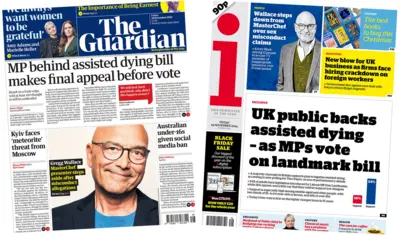We've updated our Privacy and Cookies Policy
We've made some important changes to our Privacy and Cookies Policy and we want you to know what this means for you and your data.
Call for more social media checks on firearms applicants
Top Stories
Police should use social media checks more often when considering firearms applications, according to a report.
The force's watchdog said accounts - currently not routinely checked - could be "a useful source of information" about an applicant's suitability.
HM Inspectorate of Constabulary in Scotland highlighted cases in England and Wales where extremist views or "inappropriate" pictures came to light.
HMICS said this might have had an impact on the issuing of certificates.
Top Stories
Overall, the report on firearms licensing said it had become more consistent since the introduction of Scotland's single police service.
It follows the setting up of a single IT system for licensing, national training and new processes to assess the suitability of all applicants.
Top Stories
Home visits
HM Inspectorate of Constabulary in Scotland said there was a renewed focus on providing a better service.
But it called for Police Scotland to consider more frequent use of unannounced home visits.
And it said the way licensing was resourced did not suit all local divisions.
HMICS expressed surprise at the lack of more thorough checks on visitors, with almost 5,000 permits for firearms and shotguns issued to people visiting Scotland to shoot in 2017.
The report also backed the force's requirement for applicants to have a medical report as "a significant step forward in protecting the public in Scotland".
HMICS chief inspector Derek Penman said: "The primary purpose of firearms licensing is to protect and promote public safety.
"Whilst the vast majority of firearm certificate holders use their firearms responsibly and safely, tragic incidents in the past have shown the need for effective licensing and processes, which assess the suitability of individuals to possess and use firearms.
"Significant progress has been made since the establishment of Police Scotland to develop a national firearms licensing service and to deliver a new system of air weapon licensing."
'Out of date'
HMICS produced the report after speaking to 1,000 members of the public who had experience of Police Scotland's firearms licensing service.
It has made a series of recommendations, including better staff training and a call for the publications of more detail on how effective the service is.
Mr Penman said: "Firearms licensing law, policy and procedures are complex and need to be supported by effective guidance for police officers and staff.
"Police Scotland's standard operating procedure is out of date and does not reflect current practice and should be updated as soon as possible."
HMICS welcomed the "increased focus" on gathering information about an applicant's medical history and their suitability to possess a firearm.
It highlighted "the need for Police Scotland to agree a protocol with GPs on what steps should be taken when ill health or unsuitability is identified".
'Proper checks'
Police Scotland welcomed the report which it said praised "the significant progress made in the delivery of a consistent and effective firearms licensing service".
Assistant Chief Constable Mark Williams said: "Our service is designed to protect and promote public safety and evidence suggests the national firearms licensing service is improving and operating efficiently.
"Every firearms certificate granted is done so only after full and proper checks have been carried out. Applicants also have to demonstrate that they use their firearms on a regular, legitimate basis for work, sport or leisure.
"Work has already begun to improve our training and operating model and the recommendations made will be acted upon."
He added: "We are particularly pleased that HMICS commented positively on the work that has been carried out to ensure that GPs in Scotland are fully engaged in assisting us to make more informed decisions on the medical suitability of applicants for firearms and shotgun certificates.
"We view this as a significant contribution towards ensuring public safety."
Top Stories
More to explore
Most read
Content is not available








